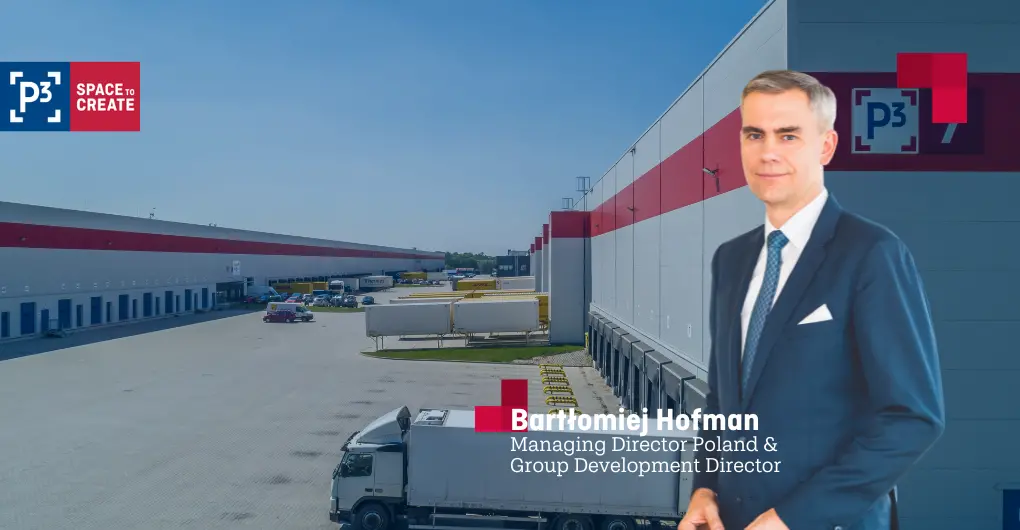

Selling land is a complex process and buyers also face challenges in today’s market. With its strong track record in land purchases, P3 Logistic Parks is a trusted partner for land owners seeking a sale. Bartłomiej Hofman, Group Development Director for P3 Logistic Parks and Managing Director for P3 Poland, discusses how market conditions affect whether land transactions succeed or fail, and what makes a good buyer during uncertain times.
Selling land for industrial use can be a lengthy and difficult process for owners who want to unlock capital, or enact a business plan. What’s going on?
Speaking as a buyer of industrial land, a few things are having an effect. The whole economy is in an inflationary phase and this increases the cost of borrowing for buyers who need a lender to finance a purchase. Today, the interest rate on loans is far higher than it used to be, which makes this even more challenging for some players. Also, due to the general uncertainty, banks require significantly higher pre-letting levels than before, in order to be certain that a buyer has enough demand from tenants to fund future loan repayments.
To complete a transaction successfully, you need to link an investor and, in some cases, future occupiers to a plot of land. At present, this is difficult for some developers, which creates a risk for an owner of a sale failing to complete. A related risk for owners is when a potential buyer takes an option to buy the land, but doesn’t acquire it outright because the tenants and financing are not in place yet. This means the owner is basically at the mercy of money markets, and the buyer’s ability to attract tenants.
Is selling land to P3 different?
For sellers, working with P3 has far fewer risks. Thanks to our sound financial standing, P3 doesn’t need external finance in order to make a deal happen. As we are focused on buying the best plots for our land bank today, we don’t take options to acquire a plot at some undefined point in the future. Of course, we do the same legal, technical and environmental due diligence as every buyer should, but we don’t attach conditions over which sellers have no control.
For example, we are currently developing a site in Katowice, Poland, where the time between the first discussions with the seller and the closing of the deal was less than six months. Being able to act swiftly but thoroughly like this is a benefit of doing business with P3, thanks to the strengths of our business. We offer more certainty, which is important because a land sale is an extremely significant transaction involving a high amount of capital.
Additionally, we’re not looking only for ‘perfect’ plots from the perspective of permits, because our dedicated team of experts for land acquisitions can work successfully with what is available on the market and organize all the necessary permitting that suits our needs and those of our customers, after a transaction is finalised.
Right now, we’re interested in both greenfield and brownfield sites, inside and outside of city boundaries. For logistics, the top priorities at a site are access to key transport networks, the available workforce, and places where we can develop business parks. We’re growing our land bank in order to offer industrial-sector companies a variety of options, and to deliver quickly for them.
What is the industrial market like, at present?
The whole market is growing across Europe, driven in part by e-commerce. In my region of Poland, the e-commerce market has more than doubled (+127%) in the past four years, which is an average annual growth rate of 23%. According to forecasts for the next five years, the increase will be around 11% per year. Currently, every third warehouse in Poland carries out operations for companies operating in the e-commerce sector.
This demonstrates there’s huge demand for warehouse and logistics space and that sellers of land should not struggle to attract interest. Additionally, planning restrictions shrink the pool of available land for warehouse development in some countries, particularly in western Europe.
Buyers of industrial land tend to be developers, such as P3. But I’d say there are only few industrial developers capable of ‘moving the needle’ and getting a deal done successfully and in a timely way. Unlike the residential sector, there’s a very limited pool of buyers because the capital required is extremely high. Also, land is not like a commodity market where you know the price of a thing at any given time.
Additionally, securing land for building warehouses, factories or logistics centres is different from residential purchases, where you can divide a plot of land into small parcels and develop it step by step. With industrial land, you usually need to develop it all at once, or perhaps in few stages. Without the right skills and financing capabilities, you cannot do this.
At P3 Poland, in the past five years we’ve successfully completed land purchases of about 1,1 million m² from many different sellers. Today, we have a land bank exceeding 950,000 m² GLA. Our background and track record show we’re a trusted, reliable partner in the transaction process.